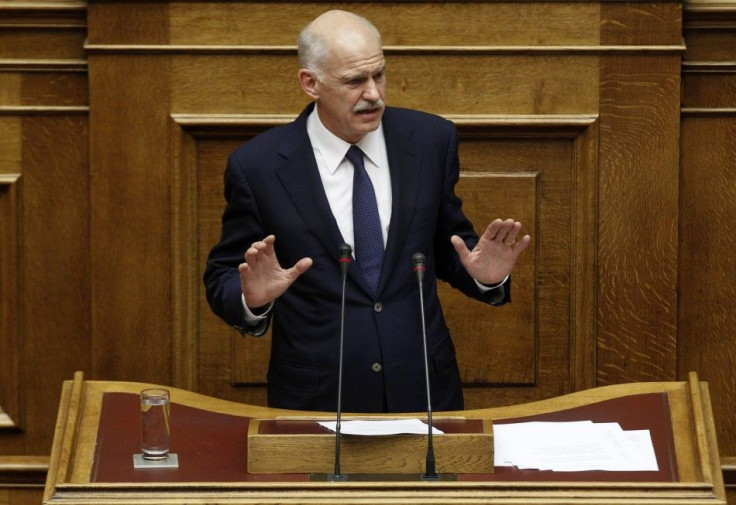Greek PM George Papandreou Wins Confidence Vote

Greek Prime Minister George Papandreou has won a parliamentary confidence vote and avoided snap elections that would have affected Greece's bailout deal and the Eurozone's economic crisis.
According to Reuters, Papandreou's socialist government won, as all his party lawmakers in the 300-member parliament supported the government. However, his term as prime minister seems close to an end, the news agency reported. The socialist government won with 153 votes.
Papandreou had earlier called for a new coalition government to approve the approximately 130 billion euro bailout deal for saving the country from bankruptcy and tackling the Eurozone's economic crisis. He has also signaled he was ready to stand down, Reuters reported.
Papandreou told parliament on Friday, prior to the confidence vote, that he would go to the Greek President on Saturday and discuss the formation of a broader-based government to secure the Eurozone bailout, according to the Reuters article.
He also said he was willing to discuss who would head a new administration, according to Reuters.
The confidence vote for the Greek prime minister was the tool used to determine whether Papandreou has enough support to remain in office.
Greece had faced a possible dissolution of its coalition government -- something that threatened to delay Europe's debt plan and launch it into a default that could affect the global credit markets, and by extension Europe's economy and, most likely, the global economy.
Earlier this week, an embattled Papandreou announced that he would put the European debt deal to a public vote. Papandreou said he announced the referendum on Monday to ensure that there would be political consensus for the deal. His opponents have said they are willing to back it conditionally. They have also claimed Papandreou is clinging to power.
Reuters has reported that opposition politicians want Papandreou to resign and that early elections be held as a price for their support for the bailout deal.
Papandreou has since tossed that plan after he came under intense pressure from European leaders.
Stocks Fall
Stocks fell on Friday amid investor jitters that the Greece might not follow through with the austerity program it needs to prevent a default on its debt. The Dow Jones Industrial Average closed down 61 points to close at 11,983 -- a loss of 2 percent for the week. It was the Dow's first weekly loss since September.
According to The Associated Press, the euro fell to $1.3778 late Friday, compared with $1.3834 late Thursday.
Papandreou on Friday said that the new debt deal for Greece, which was agreed on last month, is an opportunity that must not go to waste. He renewed a call for opposition support for the plan, the AP reported.
Bondholders Asked to Take 50 Percent Loss
European leaders on Oct. 26 agreed that banks and other major investors in Greek bond holders must take losses of up to 50 percent to give the Greek government the best chance of avoiding a default. Most economists still view a Greek default as having greater costs for the global economy at large, than a bailout plan.
According to reports, the reduction would decrease Greece's debt to 120 percent of its gross domestic product from 150 percent. The difference will reportedly save the country an estimated €100 billion or $140 billion.
The 27-member European Union has said banks will be asked to raise about $150 billion in new capital -- cash that will serve as a cushion against any possible losses on their holdings of European government bonds that have dropped in value.
© Copyright IBTimes 2025. All rights reserved.






















